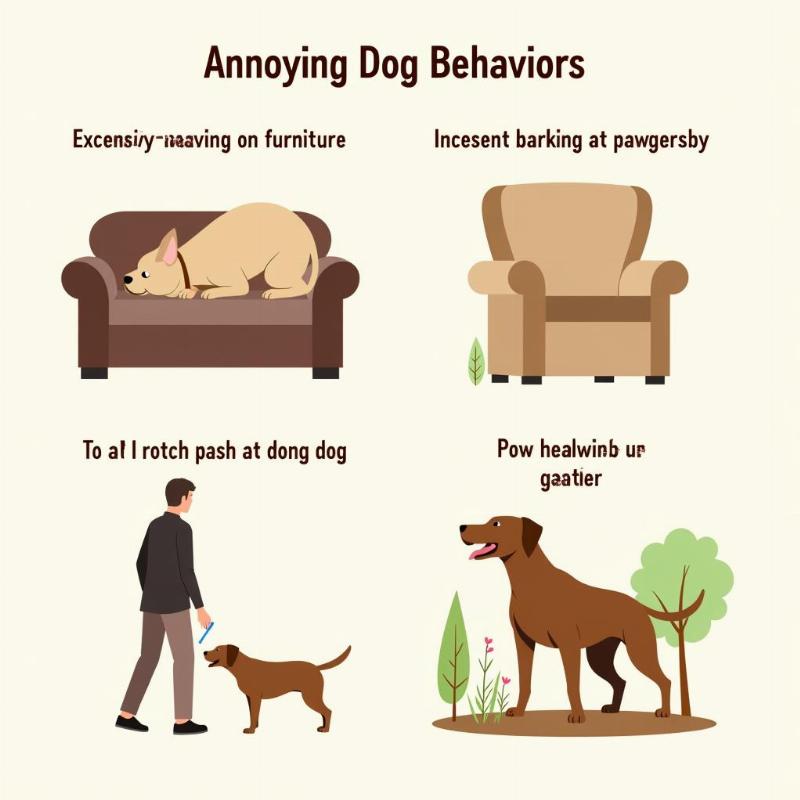Let’s face it, sometimes our furry friends can be a real pain in the… well, you know. If you’re Googling “why is my dog so annoying,” you’re not alone. Many dog owners experience moments of frustration with their canine companions. But before you banish Fido to the doghouse, let’s explore the reasons behind those annoying dog behaviors and how to address them.
Decoding Annoying Dog Behaviors
 Chó có những hành vi gây khó chịu như nhai đồ và sủa.
Chó có những hành vi gây khó chịu như nhai đồ và sủa.
So, what constitutes “annoying” dog behavior? It’s subjective, of course. What one owner finds endearing, another might find maddening. However, some common complaints include excessive barking, destructive chewing, jumping on people, begging at the table, digging in the garden, and constant attention-seeking. These behaviors often stem from unmet needs, boredom, or underlying anxiety. Let’s dive deeper.
Boredom and Lack of Stimulation
A bored dog is often a mischievous dog. If your dog isn’t getting enough physical exercise and mental stimulation, they’ll find ways to entertain themselves, often in ways we don’t appreciate. Think of that chewed-up sofa as a cry for help!
Anxiety and Stress
Anxiety can manifest in many ways, including excessive barking, destructive chewing, and clinginess. Changes in routine, loud noises, or separation anxiety can trigger these behaviors. Identifying the source of your dog’s anxiety is crucial to addressing the problem.
Lack of Training and Clear Boundaries
Dogs thrive on structure and routine. Without clear boundaries and consistent training, they can become confused and frustrated, leading to undesirable behaviors. Think of it like a child who doesn’t know the rules – chaos ensues.
Turning Annoying into Awesome
Now that we’ve identified some potential culprits, let’s discuss how to transform your annoying dog into a well-behaved companion.
Exercise is Key
A tired dog is a good dog. Ensure your dog gets plenty of exercise appropriate for their breed and age. Daily walks, runs, playtime in the park, or even a good game of fetch in the backyard can make a world of difference.
Mental Enrichment
Just like their bodies, dogs need mental exercise. Puzzle toys, training sessions, and interactive games can keep their minds engaged and prevent boredom. Consider enrolling your dog in agility or obedience classes for an extra challenge.
Consistent Training
Training isn’t a one-time event; it’s an ongoing process. Consistent training helps establish clear boundaries and reinforces desired behaviors. Positive reinforcement methods, such as rewarding good behavior with treats and praise, are highly effective.
Addressing Anxiety
If you suspect your dog’s annoying behavior stems from anxiety, consult with a veterinarian or a certified dog trainer or behaviorist. They can help identify the underlying cause and recommend appropriate strategies, such as behavior modification techniques or medication.
Conclusion
While dealing with an “annoying” dog can be frustrating, understanding the reasons behind their behavior is the first step to finding a solution. With patience, consistency, and a little bit of effort, you can transform your annoying dog into a well-adjusted, loving companion. Remember, those annoying behaviors are often a cry for help. By addressing your dog’s needs, you can strengthen your bond and enjoy a more harmonious relationship.
FAQ
- Why does my dog bark so much? Excessive barking can stem from boredom, anxiety, territoriality, or simply wanting attention.
- How can I stop my dog from chewing everything? Provide plenty of chew toys, exercise your dog regularly, and use deterrents on furniture.
- Why does my dog jump on people? Dogs often jump to greet people, but it can be trained away with consistent redirection and positive reinforcement.
- Why does my dog beg at the table? Never give your dog table scraps. Teach them to stay in a designated area while you’re eating.
- How do I stop my dog from digging in the garden? Provide a designated digging area, ensure they get enough exercise, and use deterrents in your garden.
- Why is my dog so clingy? Clinginess can be a sign of anxiety or simply a strong bond with you. Encourage independence through training and playtime.
- When should I seek professional help for my dog’s behavior? If you’ve tried various methods and your dog’s behavior isn’t improving, or if it’s aggressive or dangerous, consult a veterinarian or certified dog trainer.
Related Articles
Beautdogs.us is your premier resource for all things dog-related in the US. We offer expert advice on dog breeds, care, and training, as well as a curated selection of products to enhance your dog’s life. Whether you’re a new dog owner or a seasoned pro, Beautdogs.us is your trusted source for comprehensive and engaging information on canine companionship. Contact us at [email protected] or +1 501-555-7529 for all your dog-related needs.